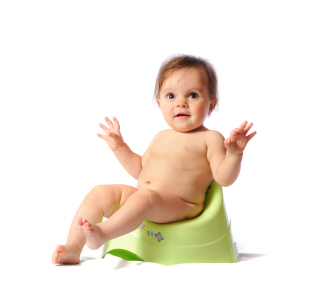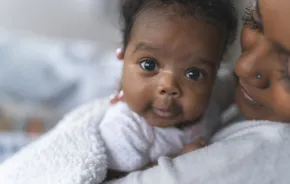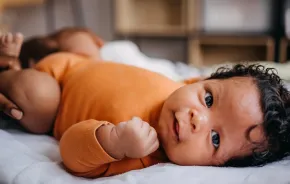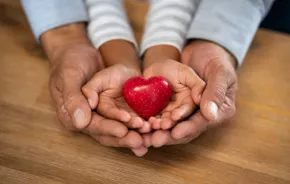 Diapers on baby bottoms are like whiskers on kittens — everyone expects them. We consider cloth versus disposable, diaper service versus washing at home, and one brand versus another. Rarely do we consider introducing potty training until our babies are up and walking. The transition from diapers to the potty can sometimes be frustratingly slow.
Diapers on baby bottoms are like whiskers on kittens — everyone expects them. We consider cloth versus disposable, diaper service versus washing at home, and one brand versus another. Rarely do we consider introducing potty training until our babies are up and walking. The transition from diapers to the potty can sometimes be frustratingly slow.
But, let’s not be so hard on ourselves. We diaper babies because they don’t have control of their elimination functions. For a child to be ready to make the transition out of diapers, several factors — many of which are out of our control — must be in place: the child’s physical development, interest, desire, exposure to the idea, and parental vigilance. Every parent will have a different threshold for potty training. Here are some ideas that can help.
Potty training babies
Many parents never use a single diaper! While this is mostly seen in developing nations, where diapers are a luxury, some families in your neighborhood may avoid diapers entirely. A diaper-free lifestyle requires a commitment to reading baby’s cues and a high tolerance for potty misses. It’s not for everyone.
But anyone can take a page from the diaper-free playbook by offering babies and toddlers a chance to associate elimination with something other than diapers. Introducing a baby to a potty offers another option, says Jenn Wood, a mom from Beacon Hill. “We spend two or more years teaching babies to use a diaper for elimination. Then suddenly we tell them not to use a diaper, but to use a new contraption we call a potty. And we wonder why they sometimes have trouble!” Wood consistently offered her daughter, Malia, a chance to use a potty as an infant, and Malia no longer needed diapers during the day or night by the time she was 19 months old.
In fact, parents can introduce the potty to a baby literally anytime after birth. Besides getting the baby used to the potty, you can also avoid that all-too-common diaper-changing mishap: being sprayed by a fountain of baby pee. Rather than dodge the fountain, some parents hold the baby on the potty the second the diaper comes off. Voilà! Urine is captured in a handy disposal object. With regular opportunities (called “pottytunities” by those who skip diapers), you may be surprised by increasing dry diapers, and baby will certainly start to learn that a diaper need not be the only place to eliminate waste.
Potty training your baby has an added benefit: You’ll start to be more in tune with your baby’s cues, which can result in better communication and connection with your baby. That connection can be inspiring. As Queen Anne mom Jenni Pertuset says, “I found that I couldn’t not do it. It just felt wrong to ignore cues when I did recognize them.”
Potty training toddlers
If you’re not up for baby training (known as “elimination communication”), start your older baby’s or toddler’s introduction to the potty with lots of talk about the potty, reading about the potty and/or offering a potty or toilet seat reducer. The sooner you offer the potty, the better, because a child won’t think to resist something that is new when practically everything in his world is new. But it’s important never to pressure a child to potty train before she is developmentally and physically ready. Potty introduction should be easy and gentle. Misses are a natural part of potty learning, and nighttime dryness takes time. Bladder control may not be fully established until 5 or 6 years of age.
We all have days when we must relax our standards; sometimes cheese and crackers is the best we can make for dinner. Sometimes getting dressed is a victory and a shower will have to wait one more day. On those days, even the most committed parent needs to ease up a tad. Tukwila mom Heidi Watters gave herself and her baby permission to relax when it came to potty learning. “If we were having a bad day, we used more diapers and didn’t stress it,” she recalls. How did that work out for Watters? Not bad; her daughter was out of diapers well before she was a year old.
On the bumpy road of parenting, things almost never work out the way we envision, and potty training is no exception. There rarely exist obvious reasons why some babies abandon diapers early and some late. A toddler who is using the potty consistently may even insist upon diapers for a while. Best not to invest too much in when your child ultimately makes the transition out of diapers. But if you can introduce pottytunities early and often, you just might find that transition a bit easier.
Tera Schreiber is the former executive director of Great Starts Birth & Family Education and a freelance writer who focuses on parenting issues. Having introduced her three daughters to the potty, she has learned there is more than one way to potty train a child. In fact, there are at least three different ways.
Great books on potty training
You Can Go to the Potty (Sears Children’s Library) by William Sears, M.D., Martha Sears, R.N., and Christie Watts Kelly
The Diaper-free Baby: The Natural Toilet Training Alternative by Christine Gross-Loh
The Princess and the Potty or The Prince and the Potty by Wendy Cheyette Lewison











